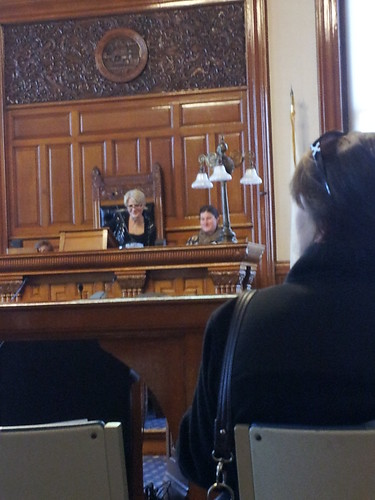Results of Lowell tax lien auction

The city of Lowell held its first in a very long time tax lien auction yesterday in the City Council chamber of Lowell City Hall. City Treasurer Elizabeth Craveiro (shown above) ran the auction which was attended by about 30 people. Ten seats in the front row of the spectator’s section had “reserved” signs taped to them. They were for the bidders who had pre-qualified. As each of the potential bidders arrived, he or she received a manila envelope containing among other things a sheet of heavy-weight yellow paper with a large number imprinted on it. This is how bids would be recognized and identified.
The auction opened shortly after 10 am. The Treasurer first explained that the auction would open with the sale of a single bundle containing all properties remaining (some had been pulled back either because the back taxes were suddenly paid in whole or part with a payment plan, or some had environmental or legal problems). The minimum bid for the entire bundle would be $6,099,997. The bidding opened but no bids were made. The Treasurer immediately announced “Hearing no bids, the auction for the entire bundle is closed.” Three sub-bundles were then offered for sale, one at a time. The minimum bids were $1,826,855 for the first; $1,813,424 for the second; and $2,459,717 for the third. No bids were made for any of these packages and each auction was immediately closed. The Treasurer then announced “That concludes our tax lien sale; thank you for attending.” And in much less time than it took me to type this paragraph, the entire proceedings had ended.
So what happened? I believe that none of the ten qualified bidders had any intent on bidding for one or all of the bundles, especially with the minimum bids that were required. Presumably they were there in the event that the bundles would be further broken down into individual properties but that was not the case. As I wrote on Wednesday, the sale of tax liens by municipalities in Massachusetts is a relatively rare event. The reason for that isn’t so much its soundness as a business or financial practice, but because obtaining clear title through a tax sale is a process fraught with legal uncertainty. Although I’m not privy to the city’s rationale in bundling a bunch of properties together, I assume it was to prevent bidders from cherry picking the best of the lot and leaving the city with all the problem cases. By packaging properties together, the buyers, to get the good properties, would also have to take a few of the difficult ones. Whatever the case, it’s my understanding that the city did collect in excess of $500,000 in back taxes as property owners scrambled to get current or at least enter into payment plans. So from that strategic perspective, it was a good move. Undoubtedly there will be more discussion of this at some future city council meeting.